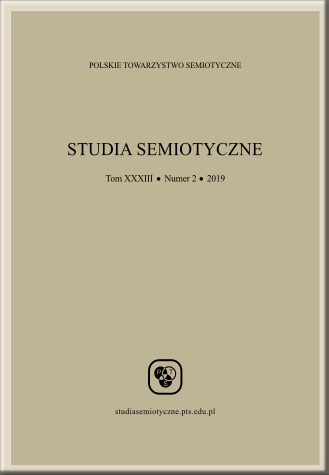Abstract
DOI: http://doi.org/10.26333/sts.xxxiii2.13
The paper develops a speech-act based account of communicative irony. A central idea behind the proposed model is that verbal acts of ironizing fall under what John L. Austin called the doctrine of the etiolation of language. After discussing the notion of communicative irony construed along the lines of Mitchell S. Green’s model of expressive communication, we elaborate on the Austinian idea of linguistic etiolation by contrasting the serious and etiolated uses of language, where the latter are parasitical on the mechanisms of the former. We argue that echoing and overt pretending are two complementary techniques of linguistic etiolation that enable one to perform acts of expressing one’s negative attitudes towards contextually available mental or linguistic representations. We also show that the proposed model of linguistic etiolation allows us to account for a number of verbal cases of communicative irony.
References
Attardo, s. (2000). Irony as Relevant Inappropriateness. Journal of Pragmatics, 32, 793–826.
Austin, J. L. (1961). Philosophical Papers, Oxford: The Clarendon Press.
Austin, J. L. (1975). How to Do Things with Words. Oxford: The Clarendon Press.
Austin, J. L. (1993). Mówienie i poznawanie (przeł. B. Chwedeńczuk). Warszawa: Wydawnictwo Naukowe PWN.
Austin, J. L. (2013). Truth. Proceedings of the Aristotelian Society. The Virtual Issue, 1, 1–15.
Bach, K. (1994). Conversational Impliciture. Mind & Language, 9(2), 124–162.
Bach, K., Harnish, R. M. (1979). Linguistic Communication and Speech Acts. Cambridge, Mass. and London, England: the MIT Press.
Bar-On, D. (2013). Origins of Meaning: Must We ‘Go Gricean’? Mind & Language, 28(3), 342–375.
Clark, H. H., Gerrig, R. J. (1984). On the Pretence Theory of Irony. Journal of Experimental Psychology, 113(1), 121–126.
Dynel, M. (2014). Isn’t it ironic? Defining the scope of humorous irony. Humor. International Journal of Humor Research, 27(4), 619–639.
Garmendia, J. (2011). She’s (not) a Fine Friend: „Saying” and Criticism in Irony. Intercultural Pragmatics, 8(1), 41–65.
Garmendia, J., Korta, K. (2007). The Point of Irony. W: M. Aurnague i J. M. Larrazabal (red.), Language, Representation, and Reasoning (s. 189–200), Leioa: UPV-EHU.
Green, M. (2007). Self-Expression. Oxford: Oxford University Press.
Green, M. (2009). Speech Acts, the Handicap Principle and the Expression of Psychological States. Mind & Language, 24(2), 139–163.
Green, M. (2017). Irony as Expression (of a Sense of the Absurd). Baltic International Yearbook of Cognition, Logic and Communication, 12, 1–24.
Grice, P. H. (1989). Studies in the Way of Words. Cambridge, Mass. and London, England: Harvard University Press.
Levinson, s. C. (2010). Pragmatyka (przeł. T. Ciecierski i K. Stachowicz). Warszawa: Wydawnictwo Naukowe PWN.
Pelc, J. (1971). O użyciu wyrażeń, Wrocław-Warszawa-Kraków-Gdańsk: Zakład Narodowy imienia Ossolińskich, Wydawnictwo Polskiej Akademii Nauk.
Sbisà, M. (2007). How to Read Austin. Pragmatics, 17(3), 461–473.
Sbisà, M. (2009). Uptake and Conventionality in Illocution. Lodz Papers in Pragmatics, 5(1), 33–52.
Sbisà, M. (2013). Locution, Illocution, Perlocution. W: M. Sbisà i K. Turner (red.), Pragmatics of Speech Actions (s. 25–76). Berlin and Boston: De Gruyter Mouton.
Searle, J. R. (1969). Speech Acts. An Essay in the Philosophy of Language, Cambridge: Cambridge University Press.
Searle, J. R. (1987). Czynności mowy (przeł. B. Chwedeńczuk). Warszawa: Instytut Wydawniczy „Pax”.
Sperber, D. (1984). Verbal Irony: Pretence or Echoic Mention? Journal of Experimental Psychology, 113(1), 130–136.
Szymura, J. (1982). Język, mowa i prawda w perspektywie fenomenologii lingwistycznej J. L. Austina. Wrocław-Warszawa-Kraków-Gdańsk-Łódź: Zakład Narodowy Imienia Ossolińskich, Wydawnictwo Polskiej Akademii Nauk.
Wharton, T. (2003). Natural Pragmatics and Natural Codes. Mind & Language, 18(5), 447–477.
Wilson, D. (2006). The Pragmatics of Verbal Irony: Echo or Pretence? Lingua, 116, 1722–1743.
Wilson, D., Sperber, D. (2012). Meaning and Relevance. Cambridge: Cambridge University Press.
Witek, M. (2011). Spór o podstawy teorii czynności mowy. Szczecin: Wydawnictwo Naukowe Uniwersytetu Szczecińskiego.
Witek, M. (2015a). An Interactional Account of Illocutionary Practice. Language Sciences, 47, 43–55.
Witek, M. (2015b). Linguistic Underdeterminacy: A View from Speech Act Theory. Journal of Pragmatics, 76, 15–29.
Witek, M. (2015c). Mechanisms of Illocutionary Games. Language and Communication, 42, 11–22.
Witek, M. (2016). Accommodation and Convention. Polish Journal of Philosophy, 10(1), 101–116.
Witek, M. (2019). Illocution and Accommodation in the Functioning of Presumptions. Synthese. doi: 10.1007/s11229-019-02459-4.
Witek, M. (w przygotowaniu). Verbal Irony as Etiolation. A View from Speech Act Theory.


